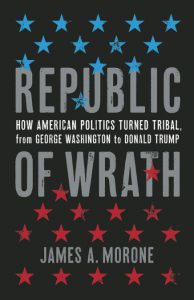 This week we’re looking at a a truly fascinating history of just how fragmented America has been seemingly from its very founding – including incidents just prior to the Civil War that would make even the most heated activists of today blanche in terror. This week we’re looking at Republic Of Wrath by James Morone.
This week we’re looking at a a truly fascinating history of just how fragmented America has been seemingly from its very founding – including incidents just prior to the Civil War that would make even the most heated activists of today blanche in terror. This week we’re looking at Republic Of Wrath by James Morone.
Unfortunately I’m facing a form of “writer’s block” these days that is barely allowing me to write a Goodreads level review, so that is all I have to offer this week.
Excellent History Lesson. I’m a guy that prides myself in knowing more about American history than most. (Well, let’s be honest, my normal line is that I know more about most than most, and that generally holds true – even when people know far more than I do about a given topic.) Anyways… 😀 This book did a phenomenal job of bringing forth quite a bit of American history that even I wasn’t aware of, particularly in my acknowledged weak area between the War of 1812 and the Civil War. For example, despite how heated American political discourse feels at times over the last couple of years in particular, apparently there was a point in the lead-up to the Civil War where *Congressmen* routinely brought knives and guns *onto Capitol Hill*. Indeed, one line Morone quotes from a Congressman of the time is that those that didn’t bring a knife and a gun brought two guns! While the ending of the narrative, with Morone’s recommendations of how to fix where we find ourselves, is more “your mileage may vary” level, the lead up to that point is a solid look at American history, if hyper focused on the general premise that all conflict came from either race or immigration – which is a bit disingenuous at times, but the analysis here isn’t so flawed as to claim absolute exclusivity to the premise. Absolutely a must-read for Americans and really anyone wishing to understand how America has arrived at its current place in time. Very much recommended.
